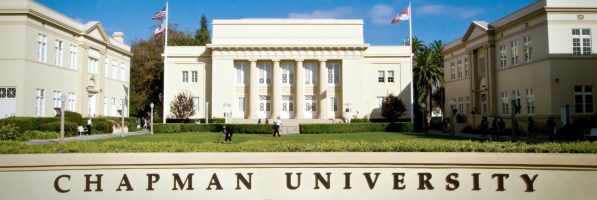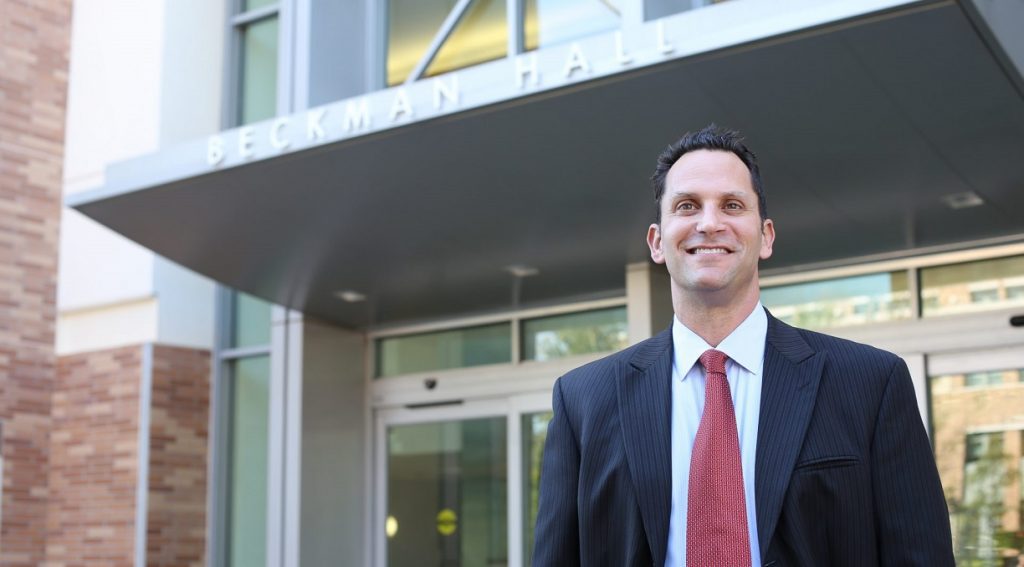Los Angeles News: Chapman Alum Returns as New COO, and More

Let’s take a look at some of the biggest news coming out of Los Angeles business schools this week.
Brian’s Journey to COO: An MBA Network That Made Career Aspirations Reality – Chapman University Newsroom
The Argyros School of Business at Chapman University profiled alumni Brian Goodman, whose experience in the Chapman MBA program led him to a role as Chief Operating Officer.
Goodman, who had been working as a corporate attorney, entered Chapman’s EMBA program in the fall of 2015, quickly taking advantage of the many networking opportunities the program offered. It was through one of these MBA-association events that Goodman met Robin Follman-Otta, who would ultimately help shape his career by offering him the COO role at her firm, Markall Incorporated and RA Industries. Although Goodman never expected finding himself in the manufacturing industry, he joined Robin’s company shortly after his May 2017 graduation and has found it a perfect fit. He credits the Chapman EMBA program with providing him both the professional network and experience to make crucial progress in the business world.
Read more about Goodman’s experience at the Chapman EMBA program here.

Brian Goodman, the new COO of the Chapman MBA program / Photo via blogs.chapman.edu
Center for Women in Leadership Hosts Outreach Conference – Pepperdine Newsroom
The Graziado School of Business and Management at Pepperdine University recently hosted the Women in Leadership Reachout Conference on February 13 in Malibu. The day-long event involved discussion panels revolving around issues that impact women in business, such as moving through male-dominated fields, work/life balance, and strategies and goals for mentorship.
“The conference brought C-suite level women to our campus to share real-life stories of making it to the top and thriving once you get there,” said director of the Center for Women in Leadership and Graziado professor Bernice Ledbetter. “Audience members were given a once-in-a-lifetime opportunity to learn from some of the top women executives in the nation.”
The event was presented as a partnership with C200, which also presented $10,000 scholarships to three exemplary female MBA students.
You can read more about the Women in Leadership conference at Graziado here.
How and Why Cal State Fullerton Students Launch Companies Before They Graduate – The Orange County Register
The Orange County Register recently took a deeper look into the New Venture Creation and Funding class at the Mihaylo College of Business. The program, which has about 200 majors, encourages students to create startups even before graduation day—with the full support of mentors and faculty at Mihaylo. The program centers around the idea of the “lean startup,” which looks for market input early on in development. After students have created their pitch, a panel of investors hear their ideas and often are so inspired they offer funding on the spot.
Successful companies from past entrepreneurship students have included a local craft beer maker Bootlegger’s Brewery; a tutor service which helps connects students with tutors who have been through the same class, Wecademi; and an online piano lesson service called Piano with Johnny.
Read more about the Mihaylo entrepreneurship program here.
These LA Business Schools Are Helping Low Income Students Pursue Their Dreams – MetroMBA
Last week, we profiled several schools in the Los Angeles metro area, including the UCLA Anderson School of Management and Marshall School of Business at USC, which provide ample opportunities for in and out-of-state prospective MBA students that need financial assistance with their education. As well, we highlighted many of the offerings available to military veterans.
For low-income MBA applicants who also have a history of military service, there are many unique financial aid opportunities. The exact services available will depend on the school, but some of these programs are available at schools across California and the U.S.
First, there’s the Yellow Ribbon Program, which many Los Angeles business schools take part in, including Chapman University Argyros School of Business. This program awards MBA students up to $6,000 for tuition and fees. Another program open to military veterans is the Post-9/11 GI Bill, which includes payments directly to the university for tuition and fees, a monthly housing allowance, and an annual books and supplies stipend up to $1,000 per year.
Individual schools like the USC Marshall School of Business also offer their own specific scholarships for military veterans. The Schoen Family Scholarship Program for Veterans is available to full-time MBA students at Marshall and has, to date, provided a staggering $1.2 million in financial support to 173 students at the university.
You can read more about the financial opportunities for lower-income applicants here.
These LA Business Schools Are Helping Low Income Students Pursue Their Dreams

For many low-income applicants, unfortunately, the cost of an MBA program is just out of reach. That’s because, by the time you count tuition (often upwards of $80,000), boarding and books ($40,000), and other expenditures, the average cost of an MBA is around $140,000 according to Investopedia. And that’s all before you count lost salary for two years for a full-time MBA program.
What can you do?
For low-income MBA applicants in Los Angeles, California you don’t have to give up on your dreams due to money. Instead, business schools offer many options to help pay for your MBA program.
California DREAM Act
The California DREAM Act of 2011 is currently available to California residents who attended and graduated from high school in the state and are enrolled in an accredited California Institution of Higher Education. If you meet these eligibility requirements, you’ll be given access to California State financial aid and scholarships as well as specific university financial aid programs. In addition, need-based graduate applicants are eligible for the State University Grant (SUG) program, which awards up to $7,176 to help cover tuition.
California State University’s Long Beach College of Business Administration is just one of the MBA programs that provides this type of financial aid to low-income MBA applicants. The College of Business Economics at Cal State L.A. also accepts DREAM Act Applications for student financial aid.
Scholarships
MBA scholarships for low-income applicants are one of the best ways to help pay for your degree program. Scholarships vary by school and can range from a few thousand dollars per year to full-tuition coverage plus a stipend.
At the UCLA Anderson School, there are six unique fellowships available to MBA applicants.
- Donor Fellowships are awarded to MBA applicants based on professional development, intended career, community involvement, and/or financial need.
- Merit Fellowships are awarded based on the strength of a student’s application.
- External Fellowships are available for a variety of different situations and students. One example is the Girard Miller Foundation scholarship, which is awarded to a graduate student preparing for a career in state or local government finance.
Teaching Assistantships
For California MBA students, financial aid doesn’t stop in the first year. For second-year full-time MBA students, many Los Angeles business schools offer Teaching Assistantship (TA) positions. These positions are usually awarded to students who keep their grade point averages above a certain level and who apply and receive an appointment. The award amount varies by business school but, in some cases, covers 100 percent of a student’s services fee and tuition.
At UC Irvine’s Paul Merage School of Business, full-time MBA students who gain a TA appointment receive payment for 100 percent of their Graduate Student Health Insurance Program (GSHIP) premium. They also receive 100 percent of the Student Services Fee and Tuition components per quarter.
Military Veteran Aid
For low-income MBA applicants who also have a history of military service, there are many unique financial aid opportunities. The exact services available will depend on the school, but some of these programs are available at schools across California and the U.S.
First, there’s the Yellow Ribbon Program, which many Los Angeles business schools take part in, including Chapman University Argyros School of Business. This program awards MBA students up to $6,000 for tuition and fees. Another program open to military veterans is the Post-9/11 GI Bill, which includes payments directly to the university for tuition and fees, a monthly housing allowance, and an annual books and supplies stipend up to $1,000 per year.
Individual schools like the USC Marshall School of Business also offer their own specific scholarships for military veterans. The Schoen Family Scholarship Program for Veterans is available to full-time MBA students at Marshall and has, to date, provided a staggering $1.2 million in financial support to 173 students at the university.
Loans
Finally, most low-income MBA applicants in Los Angeles are eligible for federal student loans. Direct PLUS Loans are available to graduate students to help pay for educational expenses up to the cost of attendance. MBA students can request unsubsidized loans up to their full eligibility with an Income-Driven Repayment Plan that allows you to make payments based on your adjusted gross income. In most cases, payment will begin until after graduation.
For MBA applicants at Pepperdine University’s Graziadio School of Business and Management, financial aid loan application for Federal Graduate PLUS student aid and Federal Direct Stafford Loans is easy. The school provides loan counseling for graduate student borrowers, loan calculators, and more.
For more information about how your business school could help cover the cost of your MBA program, visit your school website and contact their financial aid office. Scholarships, loans, and aid opportunities vary per school. The Simple Dollar also has a handy guide on how DACA recipients may be able to handle financial expectations for students around the U.S.
Gear Up For These January MBA Deadlines

The next round of MBA admissions is swiftly approaching, with the eve of 2018 almost here. Time to mark those calendars!
New York City
The NYU Stern School of Business, Columbia Business School, and Rutgers Business School, Newark/New Brunswick are the big headliners when it comes to deadlines in the New York City metro in January.
The Forham University Gabelli School of Business, and the Syracuse University Whitman School of Management Online MBA program also have deadlines in the first weeks of the new year. Click here for more information on upcoming New York City metro deadlines.

The third round for application deadlines to Cornell’s Tech MBA on its new Roosevelt Island campus arrives January 10, 2018.
Los Angeles
The biggest Los Angeles metro business school institutions all have a slew of deadlines ready to pass within the first weeks of the new year, including the UCLA Anderson School of Management‘s full-time MBA, USC Marshall‘s part-time program, as well as the Claremont University Peter F. Drucker and Masatoshi Ito Graduate School of Management‘s part-time MBA.
Take a look at the coming deadlines in the Los Angeles metro here.
Toronto
Two Toronto metro schools have deadlines in early January, with the Ivey Business School full-time, Accelerated, and EMBA deadlines all falling on January 8, 2018. The second round deadline to the University of Toronto Rotman School of Management‘s full-time MBA also falls on January 8.
Take a look at the coming deadlines in the Toronto metro here.
Chicago
Two of the most prominent business schools in the entire Chicago metro—Chicago Booth and Northwestern Kellogg—feature a bevy of full-time, part-time, and Evening MBA deadlines before January 10. As well, the Quinlan School of Business at Loyola University’s full-time MBA for its annual spring intake arrives on January 15, 2018.
Just outside of the city, on the near border of Indiana, the Notre Dame Mendoza College of Business’ second round deadline for its full-time MBA program is set for January 9.
Get familiar with the coming deadlines in the Chicago metro here.

The second round of deadlines for the Northwestern Kellogg part-time and full-time MBA programs arrives on Jan. 10, 2018.
Boston
In Boston, the heart of America’s higher education, every January is a major month for several of the country’s most prominent MBA programs. Indeed, Harvard Business School and MIT Sloan, as well as the Questrom School of Business at Boston University, the Carroll School of Management at Boston College, and Northeastern University’s D’Amore-McKim School of Business all have MBA deadlines right at the beginning of the new year for various MBA programs.
Take a look at the coming deadlines in the Boston metro here.
For updated deadline information in Philadelphia, Washington DC, Baltimore, Atlanta, Dallas, Houston, Denver, San Francisco, San Diego, Seattle, and London, click here.
Showdown: Find Out if You Should Get an MBA in New York City or Los Angeles

The battle for hip-hop supremacy may have ended in the ’90s, but we can keep the East Coast-West Coast beef alive while looking at full-time MBA programs in New York City and Los Angeles.
Both cities are home to top business schools and are ripe with employment opportunities in booming industries. But which is best for you? Let’s take a deeper dive.
Location
We’ll start with location, location, location.
The most bustling city in the country, NYC is is the capital of the business world. More Fortune 500 companies are headquartered here than in any other city. The city is not only home to Wall Street and the world’s largest financial institutions, but also some of the largest media, marketing, and advertising companies. While New York City can be daunting in its size, it’s also furiously expensive to live in, so it may not be for everyone. Getting to know the city’s vast public transportation system is a must and it can get pretty cold in the winter, so if you’re looking for beaches, keep reading.
Meanwhile, LA is Tinseltown. The city’s economy is driven by entertainment industries like television, film, video games, music recording, and production, but also by international trade, technology, petroleum, fashion, apparel, finance, telecommunications, and tourism. In the 2017 Global Financial Centres Index, Los Angeles was ranked as having the 19th most competitive financial center in the world, and sixth most competitive in United States. The city is also the largest manufacturing center in the western United States, with the ports of Los Angeles and Long Beach comprising the fifth-busiest port in the world and a vital trade route within the Pacific Rim.
New York City Full-Time MBA Programs
Full-time MBA Programs in New York City include:
- Stern School of Business – New York University
- Gabelli School of Business – Fordham University
- Columbia Business School
- Zicklin School of Business – Baruch College
What stands out about these programs?
A Columbia MBA opens up countless career options and is sure to pay off in the long run: The average starting salaries for Columbia MBAs is $104,000, with 37 percent of full-time MBA of graduates being employed in the financial services industry.
Meanwhile, Stern’s MBA curriculum gives students tons of flexibility, and allows degree seekers to choose one or two MBA specializations, NYU allows up to three specializations from 20 plus options.
Both Gabelli and Zicklin’s full-time programs feature cohort-based structures. Gabelli’s program features a New York immersion experience where, over the course of five days, students are exposed to a number of company visits with corporations like Deutsche Bank, Money.net, and Hewlett Packard. As an alternative to completing a major, Zicklin students may pursue a joint JD/MBA in conjunction with Brooklyn Law School or New York Law School.
Los Angeles Full-Time MBA Programs
Full-time MBA Programs in Los Angeles include:
- Anderson School of Management – UCLA
- Argyros School of Business – Chapman University
- Graziadio School of Business and Management – Pepperdine University
- Marshall School of Business – USC
- Peter F. Drucker and Masatoshi Ito Graduate School of Management – Claremont Graduate University
What’s special about these MBA programs?
Anderson features a Business Creation Option for MBAs, which gives students the chance to start their own businesses while still in school. Meanwhile, the Special Project Option challenges groups to tackle problematic issues that impact an entire industry.
Chapman’s full-time MBA curriculum features three main components—core/required courses, a capstone course, and elective courses. Students have several track options available to concentrate their studies, including: Corporate Finance, Marketing, Investment Management, Entrepreneurship, Information Systems in Digital Times, and more.
Graziadio full-time MBA students have the option to spend a trimester abroad in the fall term of their second year at one of Pepperdine’s partner universities in Africa, Asia, Europe, Latin America, or Oceania.
USC MBAs have required study-away coursework called PRIME International Experiential Learning, a 10-day site visit overseas. Students must complete industry—and company-oriented recommendations in capstone projects that incorporate concepts from global strategy and global economics.
At the Drucker School, students may choose two areas of concentration to focus their studies, and select elective within these areas of concentration. Concentrations are offered in: Strategy, Finance, Marketing, Leadership, Global Management, and Information Technology Management.
Jobs and Salary
When it comes to job placement, both New York and Los Angeles have their perks.
New York is home to business school with the highest job placement rate: Around 97 percent of Columbia Business School graduates receive offers within three months of graduation. The school’s class of 2016 boasted an average starting salary of roughly $125,000 plus a $25,000 signing bonus. The top three industries that employ Columbia graduates are financial Services (37 percent), consulting (35 percent) and technology/media (10 percent).
Check out a complete breakdown of NYC salaries and employment opportunities, give our guide to getting paid in New York a read.
While Silicon Valley has a reputation for being the prime place for MBA jobs in California, LA has been catching up recently—and fast. Los Angeles has embraced the tech boom in a big way, with many Valley bigwigs and new startups alike moving their operations to Silicon Beach. With that in mind, the new era of LA innovation is creating some lofty starting salaries, particularly for MBA graduates.
Recent UCLA Anderson graduates earned an average starting salary of $121,250 with a $25,000 signing bonus, according to statistics released by the school. The top five industries to employ Anderson MBAs are in tech (30.6 percent), financial services (21.6 percent), consumer products (13.4 percent), and consulting services (13.4 percent).
Check out our guide to the highest MBA salaries in Los Angeles for more information.
Los Angeles MBA Programs that Specialize in Supply Chain Management

As businesses grow and develop, it’s up to supply chain managers, or SCMs, to effectively ensure that all goods and services are delivered in a quick, optimized manner.
SCMs are the logistical overlords of any major operation—they oversee how all the parts of their product, including raw materials, information, and finance, move from supplier, to manufacturer, to wholesaler, to retailer, and finally to the consumer.
As more and more MBA students and graduates find employment as SCMs, more business school have added courses and concentrations in supply chain management, including some top business schools in the Los Angeles metro.
If you’re a prospective MBA in the City of Angeles, take this deeper dive into these LA metro MBA programs.
The Best Los Angeles Supply Chain Management MBA Programs
Anderson School of Management – UCLA
While the UCLA Anderson School of Management doesn’t offer a concentration or major in supply chain management, related coursework is recommended for MBAs on the consulting specialization, including 240F – Supply Chain Management. The course is taught by Chris Tang, UCLA Distinguished Professor and Edward W. Carter Chair in Business Administration. Tang is a foremost scholar on supply chain management, having published more than 100 articles and five books.
The course explains how supply chains work and how to deal with many of their strategic and tactical challenges. Topics covered in the class include:
- Issues and opportunities brought by the Internet and the rise of e-business
- Instabilities caused by inadequate information-sharing
- Outsourcing
- Strategic alliances
Graziadio School of Business and Management – Pepperdine University
The Graziadio School of Business and Management offers not only one, but two specialized MBA programs that offer supply chain coursework: the Digital Innovation & Information Systems MBA and the Full-Time Applied Analytics MBA.
The Digital Innovation & Information Systems MBA is available to 15 and 20-Month MBA students and focuses on bridging the gap between business and technology. All electives in this program are offered in a blended learning format with one elective course scheduled per 7-week period and requires two Saturdays of on-campus class sessions at the West Los Angeles Graduate Campus, with the remaining coursework offered online. Related coursework includes DESC 634 – Supply Chain Management.
The Full-Time Applied Analytics MBA is an immersive program that prepares students through a core curriculum is built around Decision Sciences and Information Systems and Technology Management, with Global Business and elective course requirements to round out your education, such as DESC 627 – Supply Chain Management Analytics. The class places a strong emphasis on the development and use of analytics-based models to illustrate the underlying concepts involved in both intra-and inter-firm logistics operations.
YOU MAY ALSO LIKE: The Best Nonprofit MBA Programs in Los Angeles
Loyola Marymount University – College of Business Administration
The Loyola Marymount University College of Business Administration offers a Purchasing and Supply Chain Management Online Training Program. While not an MBA program or part of a graduate degree program, this online certificate program teaches fundamental aspects of the supply chain environment, including enterprise resource planning systems, requirement systems, interrelationships between purchasing, vendor selection, sources of supply, and more. This program is a good choice for those looking for project management experience.
Marshall School of Business – USC
Similarly to Marymount, the USC Marshall School of Business offers a graduate certificate program in Optimization and Supply Chain Management. Offered in partnership with the Viterbi School of Engineering, the program focuses on areas such as product introduction, strategic procurement, outsourcing, logistics and distribution, information technology and its role in managing global supply chains, and supply chain optimization. Units earned in the process of completing the certificate can usually be applied to an MBA degree and successful completion of the graduate certificate is documented on the graduate’s USC transcript and acknowledged with a certificate (diploma) issued by the University of Southern California.
Peter F. Drucker and Masatoshi Ito Graduate School of Management – Claremont Graduate University
The Peter F. Drucker and Masatoshi Ito Graduate School of Management offers supply chain management as an area of concentration for their MBA program. Students on this track explore concepts of supply chain management while learning to leverage technologies like big data, analytics, optimization, and geospatial systems.
Drucker is also home to the Center for Supply Chain & Logistics. After launching in 2015, the Center has partnered with business, government, trade, and policy leaders to enhance the performance of supply chains globally and the economic performance of the region. Partnership with companies like Toyota have created wonderful opportunities for students, such as the Toyota Women of Achievement Scholars program, which aims to create the future of supply chain by empowering women to take the lead in this vital field. The fellowship provides female scholars with a top notch education and formal mentor programs with other women leaders and career guidance to make the most of their degrees.
Do Social Networks Affect Our Brains? Two Tuck Professors and a UCLA Professor Research the Truth

We’re you surprised by the results of the 2016 election? According to Tuck Associate Professor of Business Administration Adam Kleinbaum and his research partners—Dartmouth Associate Professor of Psychological and Brain Sciences Thalia Wheatley and UCLA Social Psychology Assistant Professor Carolyn Parkinson—you can blame social media.
In their latest paper, “Spontaneous Neural Encoding of Social Network Position,” the group reviewed how surrounding ourselves with a close-knit group of like minds, such as on social media, can have real-world consequences in politics, business, and more. According to their paper, there’s something called the “naked emperor effect” that occurs when we fall into the trap of only relying on information from trusted networks. The phrase, taken from The Emperor’s New Clothes, explains the tendency of people to place themselves in a bubble to exchange information that no longer holds true.
For their research project, Kleinbaum and Wheatley set out to answer the question, “Do friends see the world in the same way? And if so, what are the implications of that?” To gain insight into the question—including how social networks interact with the physical structure of the brain—they asked 42 first-year Tuck students to watch a series of videos while hooked up to an fMRI machine. They found some interesting results.
According to the scans, the more similar two people’s neural responses the more likely that they would be friends. From this, the authors’ surmised that people who have similar world views are more likely to be friends and that spending time together causes “neuroplastic convergence,” or a physical change in the brain to react similarly. Basically, the human brain can and will evolve to recognize one’s place in a group.
The implications of this research can have some profound effects for companies. Since most people tend to interact with like-minded people and to increase cohesion with their network overtime, this can create a false sense of security. The key is to help your employees be exposed to different ways of thinking.
“Executives worry a lot about being able to anticipate the next big thing, or being disrupted if they fail to anticipate the next big thing,” Kleinbaum explained. “Being exposed to different ways of thinking helps us break out of our thought worlds and imagine possibilities we otherwise might never have thought of.”
To read a more in-depth review of the research paper visit the news release on the Tuck School website. Or you can find the full paper in the April issues of Nature Human Behavior.
